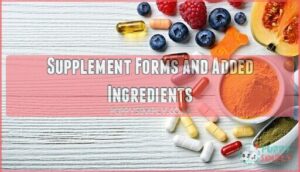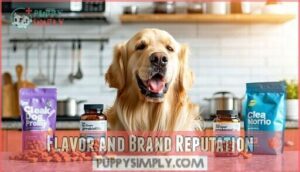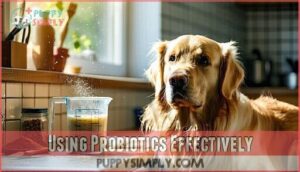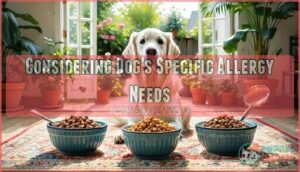This site is supported by our readers. We may earn a commission, at no cost to you, if you purchase through links.
 You’re dealing with a frustrating cycle—your dog’s itchy, uncomfortable, and traditional treatments aren’t cutting it.
You’re dealing with a frustrating cycle—your dog’s itchy, uncomfortable, and traditional treatments aren’t cutting it.
The right probiotic for dogs with allergies can break this pattern by targeting the root cause in their gut. Specific bacterial strains like Lactobacillus acidophilus and Bifidobacterium animalis work to rebalance intestinal flora, which directly impacts immune responses that trigger allergic reactions.
When your dog’s gut microbiome is healthy, their body stops overreacting to everyday allergens like pollen or certain proteins. Think of it as hitting the reset button on their immune system.
The key lies in choosing strains with proven anti-inflammatory properties and adequate colony-forming units.
Table Of Contents
- Key Takeaways
- Probiotics for Dogs
- Choosing Probiotic Supplements
- Benefits of Probiotics
- Using Probiotics Effectively
- Selecting The Right Probiotic
- Frequently Asked Questions (FAQs)
- What is the best probiotic for dogs for itching?
- What’s the best probiotic for allergies?
- Can probiotics prevent food allergies in puppies?
- How long before probiotics reduce allergy symptoms?
- Are probiotics safe during allergy medication treatment?
- Can probiotics worsen allergies before improving them?
- Do probiotics work for environmental allergies too?
- Conclusion
Key Takeaways
- You’ll see the best results with multi-strain probiotics containing Lactobacillus acidophilus and Bifidobacterium animalis, as these specific strains target the gut-immune connection that triggers allergic reactions
- You should expect to wait 2-4 weeks before noticing improvements in your dog’s allergy symptoms, since beneficial bacteria need time to establish and rebalance your pet’s gut microbiome
- You can enhance effectiveness by choosing probiotics with 10-30 billion CFUs and combining them with your dog’s existing allergy treatments under veterinary guidance
- You’ll need to match the probiotic to your dog’s specific allergy triggers and consider factors like breed predispositions, environmental vs. food allergies, and any ingredient sensitivities your pet has
Probiotics for Dogs
You can support your dog’s digestive health and potentially ease allergy symptoms by introducing beneficial bacteria through probiotic supplements.
These live microorganisms work by balancing your pet’s gut microbiome, which plays a vital role in immune system function and overall wellness.
Healthy gut bacteria boost your dog’s immune system and fight allergies naturally.
Promoting Healthy Gut Bacteria
Three key factors drive healthy gut bacteria in dogs with allergies.
Your dog’s gut microbiome diversity directly affects their immune response and allergy symptoms.
- Balanced diet with natural fibers role in feeding beneficial bacteria
- Fermented foods introduce live cultures that support gut health
- Digestive enzymes help break down allergens before they trigger reactions
- Dog allergy probiotic supplements restore microbiome balance after illness
- Probiotics for dogs with skin issues target the gut-skin connection effectively
To improve digestion, consider probiotics with Lactobacillus and Bifidobacterium.
Targeting Allergy Relief
Beyond mere digestive support, specific probiotic strains target your dog’s allergic reactions through immune response modulation.
The gut-skin connection plays a vital role—beneficial bacteria reduce inflammation and probiotics help calm overactive immune systems.
Your dog’s gut health directly impacts their skin – healthy bacteria fight inflammation from within.
Strains like Lactobacillus casei and Bifidobacterium animalis show promising results for allergy symptom reduction, making the best probiotic for dog allergies one that addresses inflammation at its source.
Benefits for Canine Health
Probiotics offer your dog significant health advantages that extend far beyond allergy reduction.
These beneficial bacteria strengthen your pet’s immune boost while promoting a balanced gut microbiome. Enhanced nutrient absorption helps your dog get more from their food, supporting overall wellness.
The best probiotic for dog allergies works by reducing inflammatory responses that trigger symptoms. Dog probiotics for allergies create lasting improvements in your pet’s comfort and energy, leading to a significant immune boost and overall wellness.
Choosing Probiotic Supplements
When selecting a probiotic for your allergic dog, you’ll need to evaluate several key factors that determine effectiveness.
The right combination of bacterial strains, supplement form, and quality ingredients can make the difference between symptom relief and wasted money.
Bacteria Strains and CFUs
When selecting probiotics for dogs allergies itching, focus on strain diversity and CFU count.
Multi-strain blends like Bacillus coagulans and Lactobacillus acidophilus outperform single options. Look for 10-30 billion CFU for allergy relief—higher counts mean better results.
Synergistic strains work together, while viability testing confirms live bacteria. Storage impact matters too; proper refrigeration maintains potency for effective dog allergy relief probiotic treatment.
Probiotics can improve your dog’s gut and immune health.
Supplement Forms and Added Ingredients
After choosing the right bacterial strains, consider how your dog will actually take their probiotic supplements. The form matters for both effectiveness and your pet’s acceptance.
- Capsule vs Powder: Capsules offer precise dosing while powders mix easily into food
- Chewable options: Many dogs prefer tasty chewable tablets that feel like treats
- Added prebiotics: Look for vitamin supplements that include prebiotics to feed beneficial bacteria
- Artificial flavors: Check ingredient quality – natural flavors work better than synthetic additives
Dog supplements for allergies come in various forms. Some probiotics contain Saccharomyces boulardii strains to prevent yeast proliferation. Pet supplements with quality ingredients guarantee better results for your dog allergy supplement probiotic needs.
Flavor and Brand Reputation
Your dog’s taste buds matter when choosing probiotics—palatability matters for consistent dosing.
Research brand trust through customer reviews and ingredient quality standards. Look for companies with ethical sourcing practices and transparent manufacturing processes.
Dog probiotic allergy relief depends on regular intake, so select flavors your pet enjoys. Reputable dog probiotics brands often have veterinary endorsements and positive dog allergy probiotics reviews.
Many owners find flavored options helpful for picky eaters, which can lead to better adherence to the probiotic regimen and overall allergy relief.
Benefits of Probiotics
When your dog struggles with allergies, probiotics offer a natural way to support their overall health from the inside out.
These beneficial bacteria work by strengthening your pet’s immune system and improving digestive function, which can help reduce allergy symptoms and promote better skin health.
Strengthening Immunity
Your dog’s immune system acts like a fortress, and probiotics help strengthen those walls.
These beneficial bacteria enhance gut barrier function while boosting antibody production and immune cell activity.
When your pup’s canine immune system runs smoothly, it’s better equipped for allergy defense.
Dog probiotic allergy relief works by helping reduce inflammation naturally, giving your dog immune support that targets the root cause rather than just symptoms.
Supporting Digestive Health
Beyond maintaining balance, your dog’s gut processes food more efficiently when beneficial bacteria thrive.
Dog probiotics enhance nutrient absorption by improving enzyme production, which breaks down proteins and fats your pet needs.
Better bowel regularity follows naturally, while inflammation reduction helps sensitive stomachs heal.
This digestive support creates the foundation for your dog’s overall wellness and comfort.
Nourishing Natural Gut Bacteria
Your dog’s gut houses trillions of beneficial bacteria that work like tiny gardeners, cultivating a healthy internal ecosystem.
Probiotics for allergic dogs help restore this delicate balanced diet of microorganisms, especially after illness or stress disrupts gut diversity.
Here’s how probiotics nourish your dog’s natural gut bacteria:
- Prebiotic sources like fermented foods provide essential nutrients that feed existing beneficial bacteria
- Fibers role becomes essential as they create the perfect environment for healthy microbes to flourish
- Dog probiotic allergy relief works by strengthening the gut’s natural defense system against allergens
Think of it as providing fertilizer for your garden – probiotics for itchy dogs don’t just add new plants, they help existing ones thrive.
This probiotic for allergic dogs approach supports long-term digestive wellness while addressing dog probiotic skin allergies through improved internal balance.
Improving Skin Condition
Probiotics work like tiny construction crews, helping rebuild your dog’s damaged skin from the inside out.
These beneficial bacteria reduce itchiness and promote healing by strengthening the skin barrier function.
Studies show dog probiotic skin allergies treatments minimize redness while supporting a healthy coat.
Probiotics for itchy dogs help hydrate skin naturally, making them excellent supplements for dog atopic dermatitis probiotic therapy and sensitive skin conditions.
Probiotics can help modulate the dog’s immune response to reduce inflammation.
Using Probiotics Effectively
Once you start probiotics for your dog’s allergies, proper dosage and timing make all the difference in seeing real results.
You’ll want to follow specific guidelines while monitoring your pet’s response to guarantee the treatment works effectively with their unique needs.
Dosage and Administration
When administering probiotic for dogs with allergies, start slowly to avoid digestive upset.
Most canine supplements require daily dosing, though dosage frequency varies by product strength and your dog’s needs. You can research the correct probiotic dosage online.
- Mix powder forms into wet food to mask taste and improve acceptance
- Store capsules in cool, dry places away from heat and moisture
- Give with meals to reduce stomach irritation and enhance absorption
- Monitor for overdose risks like loose stools or gas when starting treatment
Complementing Other Allergy Treatments
When you combine probiotics with existing treatments, you’re stacking the deck in your dog’s favor.
Research shows 62.9% of dogs using probiotic for dogs with allergies alongside standard medications experienced faster allergy relief for dogs. This antihistamine synergy helps reduce reliance on stronger steroid alternatives while supporting topical treatments and diet integration.
For immediate relief, consider hydrocortisone spray itch relief for your dog’s skin.
| Treatment Type | Probiotic Benefit | Timeline |
|---|---|---|
| Antihistamines | Enhanced effectiveness | 2-3 weeks |
| Topical creams | Improved skin barrier | 2-4 weeks |
| Allergy shots | Stronger immune response | 4-6 weeks |
| Dietary changes | Better nutrient absorption | 3-5 weeks |
Monitoring Progress and Adjusting
Your dog’s progress acts like a roadmap to success.
Track allergy symptoms weekly, noting changes in scratching, skin irritation, or digestive issues. Adjust dosage based on your vet’s guidance—some dogs need tweaks after 4-6 weeks.
Consider dietary changes alongside your probiotic for dogs with allergies. Schedule regular veterinary checkups to evaluate long-term use effectiveness and guarantee the best dog allergy treatment results, ensuring the best possible outcome.
Selecting The Right Probiotic
Choosing the right probiotic for your allergic dog isn’t a guessing game—it requires matching specific strains to your pet’s unique needs.
Your veterinarian can help identify which bacterial strains work best for your dog’s particular allergies and recommend the proper dosage for ideal results, ensuring you get the best outcome for your pet’s health by using the right probiotic.
Consulting With Veterinarians
Before introducing a probiotic for dogs with allergies into your pet’s routine, schedule a consultation with your veterinarian. Your vet’s allergy expertise helps identify specific triggers affecting your dog.
They’ll discuss treatment options and create personalized plans suited to your pet’s needs. This collaborative approach guarantees proper veterinary care and establishes follow-up care protocols for ongoing dog health advice and monitoring progress.
Some probiotics contain Lactobacillus and Bifidobacterium which can aid in dog digestion.
Considering Dog’s Specific Allergy Needs
After working with your vet, you’ll need to match the probiotic for dogs with food allergies to your pet’s specific triggers.
Each dog’s allergy profile is unique, requiring careful consideration of:
- Allergen cross-reactivity – avoiding ingredients that share proteins with known triggers
- Breed predispositions – certain breeds show higher food sensitivities requiring targeted strains
- Environmental factors – seasonal allergies may need different probiotic support than year-round issues
Individual sensitivities vary greatly, so dog skin allergy probiotic formulas should exclude dairy, beef, or chicken if these cause reactions.
For probiotic for dogs with seasonal allergies, timing and strain selection matter most for effective dog allergy treatment.
Frequently Asked Questions (FAQs)
What is the best probiotic for dogs for itching?
Looking for relief from your pup’s constant scratching?
Multi-strain probiotics containing Lactobacillus and Bifidobacterium work best for dogs with allergies.
These beneficial bacteria support gut health, which directly impacts skin conditions.
Consult your vet for strain-specific recommendations to find the best probiotics for your dog’s needs.
What’s the best probiotic for allergies?
You’ll find the best relief by choosing probiotics with multiple strains, especially Lactobacillus and Bifidobacterium. These support your immune system and reduce inflammation that triggers allergic reactions naturally.
Can probiotics prevent food allergies in puppies?
Like planting seeds in fertile ground, probiotics may help prevent food allergies in puppies by strengthening their developing immune systems early on.
Research suggests they’re most effective during critical developmental windows.
How long before probiotics reduce allergy symptoms?
Probiotics typically take 2-4 weeks to show noticeable improvements in allergy symptoms. You’ll need patience as beneficial bacteria establish themselves and begin rebalancing your dog’s immune system naturally.
Are probiotics safe during allergy medication treatment?
Generally, probiotics are safe alongside allergy medications, but you’ll want to check with your vet first.
They rarely interact negatively, though timing doses separately can help avoid any potential absorption issues, and this is a rarely occurring problem.
Can probiotics worsen allergies before improving them?
Like seeds planted in fertile soil, your body’s healing process might initially stir up reactions.
Yes, probiotics can temporarily worsen allergies as they rebalance gut bacteria, but this usually settles quickly as your system adjusts to the new balance, allowing your body to heal and find a new equilibrium.
Do probiotics work for environmental allergies too?
Environmental allergies respond differently to probiotics than food allergies. While probiotics can strengthen your immune system and reduce inflammation, they won’t directly treat pollen or dust reactions like antihistamines do.
Conclusion
Balanced bacterial blends become breakthrough solutions when you’re battling your dog’s persistent allergies.
The right probiotic for dogs with allergies transforms your pet’s immune response from overreactive to balanced.
You’ve learned about specific strains, proper dosages, and monitoring techniques that make real differences.
Start with veterinary guidance, choose quality supplements with proven strains like Lactobacillus acidophilus, and watch your furry friend’s comfort levels improve steadily over time.
- https://links.e.response.mayoclinic.org/EmailPreview-GeneralHealth
- https://mcforms.mayo.edu/mc5200-mc5299/mc5256-01.pdf
- https://pmc.ncbi.nlm.nih.gov/articles/PMC7111060/
- https://www.vet.cornell.edu/departments-centers-and-institutes/riney-canine-health-center/canine-health-information/power-probiotics
- https://petjope.com/blogs/ingredients/probiotics-for-dogs-with-allergies













